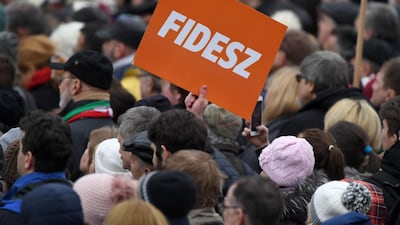Hungarian prime minister Viktor Orban accused his opponents of being foot soldiers of a clandestine “empire” run by financier George Soros during a keynote speech ahead of elections next month.
Mr Orban, who is enjoying a strong poll lead ahead of the April 8 vote, is trying to mobilise his supporters to avoid a repeat of the shock defeat he suffered in 2002. Since regaining power eight years ago, he’s built a self-styled illiberal state modelled on Russia, with a fragmented opposition and a relentless focus on the threat of immigration, which he says is being promoted by the Hungarian-born billionaire.
“Let’s not fool ourselves: the real foes we need to fight aren’t anaemic little opposition parties, but an international network organised into an empire,” Mr Orban told a rally in front of parliament in Budapest to mark a national holiday on Thursday.
The Soros-led forces are infiltrating Hungary’s election process with help from media financed by multinational companies and civic groups paid by “international speculators”, the prime minister alleged.
Mr Soros has repeatedly denied these allegations, in turn accusing the premier of running a “mafia state” and suppressing independent voices.
The prime minister’s backers had sought to gather as many as 200,000 people in the capital for the march to parliament which culminated in his address. Opposition parties are also holding separate rallies elsewhere in the city on the day commemorating Hungary’s 1848 revolution.
Fidesz’s re-election would prolong a rift with the European Union, a clash which has inspired countries including Poland to bridle against the bloc’s democratic norms.
Mr Orban has drawn criticism from Brussels by stacking independent courts and other institutions with allies, extending his influence over much of the media and opening the way to the enrichment of a new class of oligarchs with connections to the ruling party.
This campaign has been tough for the 54-year-old, whose party has been dogged by corruption allegations, which he denies. Last month, it lost a stronghold it had controlled for 20 years as a divided opposition backed a joint candidate in a by-election.
Still, the disparate opposition of parties ranging from a former far-right group to liberals has failed to bridge differences and create a joint platform on the national level.

